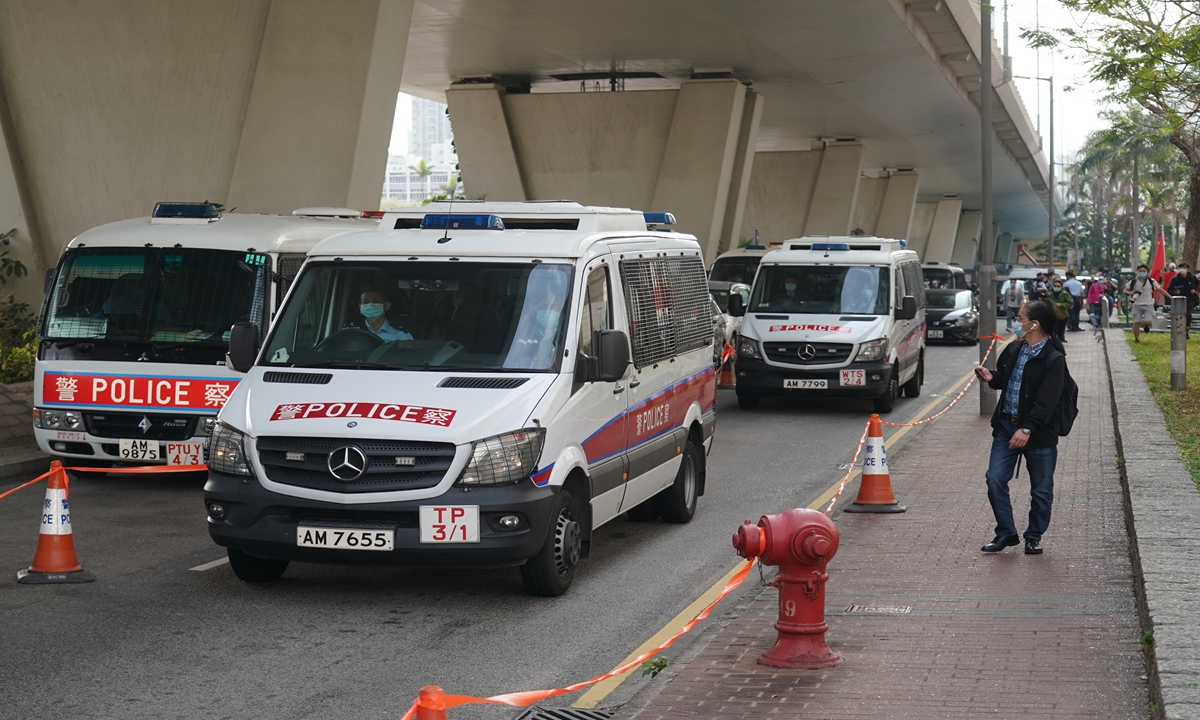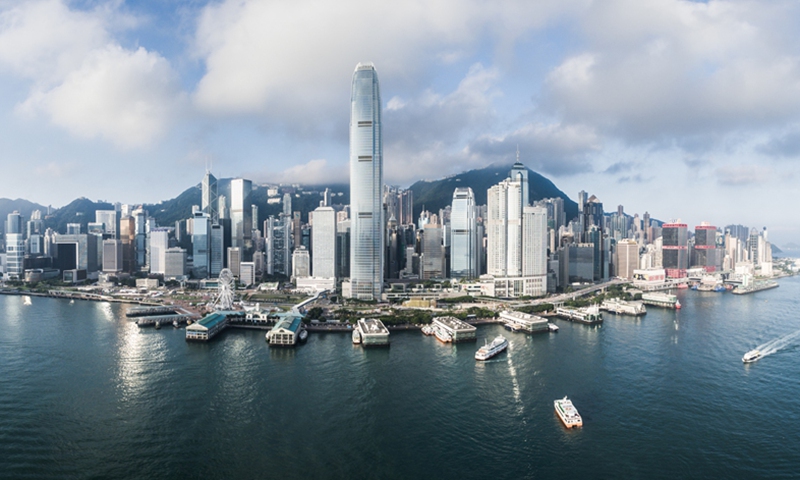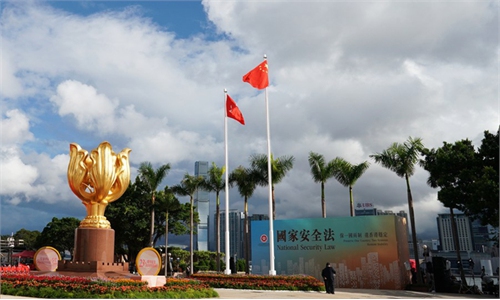
Police vans carrying 47 people in Hong Kong, arrested in January for "conspiring to subvert state power," arrive at West Kowloon Magistrates' Courts on Monday. The defendants aged between 23 and 64 faced the court the same day. Photo: VCG
Over the week, senior central government officials on Hong Kong affairs listened to views from Hong Kong society on imminent political reforms, unleashing important messages about how to plug the loopholes in existing systems and carry on the reform process, with major consensus reached on the principle of only patriots governing Hong Kong, urgency of fixing the systematic loopholes and reforms to be led by the central government.
A two-day seminar in Shenzhen, South China's Guangdong Province that borders the Hong Kong Special Administrative Region, wrapped up on Monday with a major consensus reached by representatives from Hong Kong that the chaotic situation in Hong Kong in recent years was caused by the lack of full-scale implementation of the principle, which has become an urgent task to be fulfilled under the "one country, two systems."
The seminar, which gathered predominant policymakers, scholars and former officials, was also an important channel for the central authorities to listen to the majority of Hong Kong public opinion on the upcoming electoral reform, including most likely measures and steps to take in overhauling the system.
The majority of attendees agreed on some suggestions for the reforms, including setting up a high-level scrutiny commission to review the qualifications of candidates for elections, scrapping district councilors' seats in committees to elect the chief executive and de-politicizing the district councilors, as well as expanding the scope of functional constituencies, some of them told the Global Times.
Xia Baolong, vice chairman of the National Committee of the Chinese People's Political Consultative Conference and head of the Hong Kong and Macao Affairs Office of the State Council, attended the seminar and listened to the opinions of Hong Kong society including those from industry and commerce, finance, professional and labor sectors. Those representatives agreed on the urgency of fully implementing the principle of only patriots governing Hong Kong with respect to the leading role of the central government in the city's electoral reform.
Various chaotic situations occurred in Hong Kong society and political spheres mainly stemmed from the lack of the full-scale implementation of this principle, which has also become a consensus of the attendees to the seminar. Besides the improvement of relevant systems, authorities need to enhance talent cultivation and selection, citizen education, and improve with more comprehensive measures.
The seminar sent out the second important message from the central government following Xia's speech on February 22 on political reforms in Hong Kong, which has been published in the Hong Kong-based magazine Zijing on Monday. The 9,800-word speech of the Chinese senior official pinpointed major directions of the reforms, hinting on major steps and requiring that Hong Kong must establish a democratic electoral system with Hong Kong characteristics based on the current situation in the city.
And the scope of public participation in the local elections should be expanded in order to achieve balanced participation while breaking the limits of constituencies, districts and specific groups, many attendees to the seminar suggested. Radical anti-government political figures and those who violated the national security law for Hong Kong, including those 47 charged with subversion on Monday, have been barred from participating in any form of political activity in Hong Kong, according to the central government official, some attendees to the seminar and observers on Hong Kong affairs.
Some observers also considered vigorous political reforms, which are expected to be implemented following the upcoming two sessions in Beijing, as a major way of clearing up the existing problems and plugging the loopholes in one step leaving no evil elements to endanger Hong Kong society and the national interests in the future.
Major reform measures
Tang Fei, a member of the Chinese Association of Hong Kong and Macao Studies, who attended the seminar in Shenzhen on Monday, told the Global Times on Monday that about 60 attendees have been divided into four groups for discussions, with some consensus reached on what are the aspects of the political system in Hong Kong need to be overhauled.
"One major suggestion from Hong Kong society is to set up a high-level commission for reviewing the political background of candidates for elections, either led by NPC or CPPCC, as those authorities are politically mature. Also, it's necessary to expand the scope of functional constituencies, for example by adding some new types," Tang said.
Given that Chinese companies have been playing a more important role in Hong Kong's economy, whether they will be granted the right to vote has also been widely suggested, he noted. This also echoed Xia's message in urging Hong Kong elections to make breakthroughs in limits of constituencies, districts and interest groups.
While the upcoming electoral reform would be a comprehensive and structural reform, another suggestion was overhauling the district councils, which have been heavily politicized in recent years, deviating from the involvement in community services and their legal essence, according to the people familiar with the matter.
"The reforms could be done by fully scrapping the 117 seats of district councilor seats in the 1,200-person committee selecting the city's chief executive, for example, as part of the de-politicizing campaign," Tang said, referring to the suggestions mentioned during the seminar.
The current returning officer to decide the validity can't fully evaluate in accordance with the principle of only patriots governing Hong Kong, who usually takes simplified reviewing procedures and lacks legal and professional training, Tian Feilong, a Hong Kong affairs expert at Beihang University in Beijing, told the Global Times on Monday.
"It should also replace the returning officer with scrutiny commission in order to cover more comprehensive reviews of the candidacy qualifications in LegCo, chief executive and district council elections. And the composition of the commission should be decided by the central government and Hong Kong authorities by amending the legislature," Tian said.
Hong Kong authorities are believed to be working with the central government on how to conduct those reforms and in amending relevant laws and regulations, with full detailed measures coming out in the middle or second half of March, according to people familiar with the matter.
Following the seminar, the central authorities will continue listening to more advice from various sectors of Hong Kong on improving the systems.

Hong Kong File photo
'In or out'
While the central authorities are mulling reform plans for Hong Kong, which are widely believed to be brought up at the upcoming two sessions, scheduled from March 5 and March 4 respectively, 47 anti-government figures were charged with subversion, signaling that their political life has come to an end.
They included some former LegCo lawmakers and district councilors such as disqualified legislator Leung Kwok-hung, former lawmaker Lam Cheuk-ting, anti-government legislator Jeremy Tam Man-ho, and Claudia Mo Man-ching, which will also lead to some seats being replaced in the upcoming Legislative Council (LegCo) and chief executive elections.
"Either the other pan-democratic figures turn to become loyal ones or they are out of the game," Tian said, noting that the central government will also leave the window of opportunity for these massive political reforms in Hong Kong, and those pan-democratic figures with moderate political view should become politically mature and stand with "one country, two systems."
Apparently, the central government has left no room for retreat for some radical political figures, as Xia also drew out the redline by saying figures like Joshua Wong, Jimmy Lai and Benny Tai have to be punished severely. Faced with rising criticism from some Western countries - mainly the Five Eyes alliance - Beijing has always been preparing to defend its bottom line by carrying out the reforms, hit back at those critics and take those who collude with foreign forces into account.
For instance, in response to US Secretary of State Antony Blinken's comments on the prosecution of 47 anti-government figures involved in illegal primaries in Hong Kong, Chinese Foreign Ministry spokesperson Wang Wenbin defended the Hong Kong police for carrying out their duties in accordance with the law, and said on Monday that the prosecution is a legitimate law enforcement action.
The Chinese official also urged the US government to stop interfering in China's internal affairs.
The determination of the central government in overhauling the Hong Kong political system won't be shaken by those outside noises. "Those pan-democrats with moderate views need to make more efforts to continue their political life. Otherwise, they would also see a dead end," Tian said.


